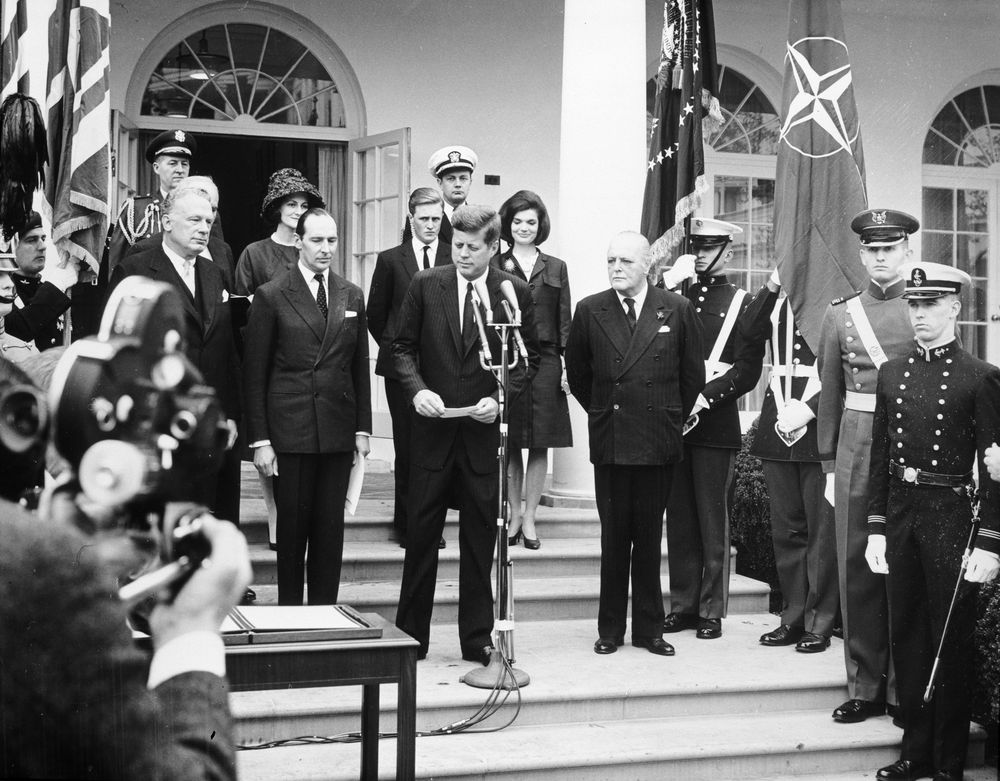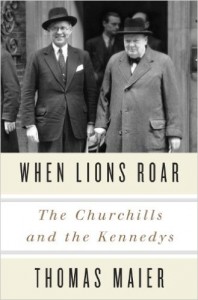
A Fresh Look at the Churchills and Kennedys by Thomas Maier
When Lions Roar: The Churchills and the Kennedys, by Thomas Maier. New York: Crown Publishers, 784 pages, $30, Kindle Edition $11.99. Written for The Churchillian, Spring 2015.
The most touching and durable vision left by Mr. Maier comes toward the end of this long book: the famous White House ceremony in April 1963, as President Kennedy presents Sir Winston Churchill (in absentia) with Honorary American Citizenship—while from an upstairs window his stroke-silenced father, Joseph P. Kennedy, watches closely, with heaven knows what reflections:
Whatever thoughts raced through the mind of Joe Kennedy—the rancor of the past, the lost opportunities of his own political goals, and the tragic forgotten dreams he had once had for his oldest son, could not be expressed. His weak, withered body, with its disfigured mouth, no longer served him…could say nothing in his own defense.
This is a readable book, elegantly written, which commits some errors. It contains much known information, except perhaps for encyclopedic revelations of which Churchills and Kennedys were sleeping with whom. In some ways one is reminded of a description applied by Warren Kimball to Volume 3 in the Manchester Churchill trilogy The Last Lion: “A nice cruise down a lengthy river you’ve sailed before.”
Meetings and consequences
The biographies surround occasions when the two families meet (or collide): 1933, 1935, 1938, and so on. Much of what we read about John F. Kennedy’s remarkable affinity for Churchill has been recorded earlier, by Barbara Leaming, in Jack Kennedy: The Education of a Statesman (2006).
Along the way are interesting takes. Churchill’s interest in secret intelligence, for example, is traced to the Boer War, when young Winston “performed a bit of reconnaissance work, posing as a civilian riding a bicycle” in the Boer capital of Pretoria. Mr. Maier tracks the Joe Kennedy-Churchill relationship thoroughly, establishing that it began in 1933 (five years before JPK became Roosevelt’s Ambassador to Britain), when he and Churchill did some joint business involving the liquor trade. This, he suggests, might today be termed influence peddling—but Churchill held no office from 1929 to 1939.
Mr. Maier gets quite a few Churchill points wrong. There’s an incomplete account of the scandal involving Lord Alfred Douglas, who in 1916 libeled Churchill (“short of money and eager for power”), accusing him of manipulating war news to benefit his mentor Sir Ernest Cassel. Maier might have added that Churchill sued and won…or that in 1941, when Douglas published a sonnet praising the now-prime minister, Churchill forgave him on the spot, saying, “Time ends all things.”
Balanced criticism
Perhaps it is hard nowadays to credit many people with kindness and altruism, like Sir Henry Strakosch, who took over Churchill’s portfolio and preserved WSC’s dwindled finances. Maier calls this a “bailout plan…considered more a gift than graft by Churchill and his benefactors….” But graft is “the unscrupulous use of a politician’s authority for personal gain.” Strakosch never made one demand of Churchill. He acted only in appreciation for the man and the leader.
Churchill the imperialist is not ignored. “Winston showed little enthusiasm for the revolutionary spirit of independence among those living in former colonies of the British Empire such as India, South Africa, Kenya, or even neighboring Ireland,” Maier writes. Not so fast! What about his post-1935 encouragement to Gandhi and Nehru; his loyalty to Smuts, who opposed Apartheid; praise of locally-ruled Kenya in 1908; his instrumental role in the 1921 Treaty that brought independence to Ireland? Against such omissions, the canard that Churchill wanted to use “poison gas” against Iraqi tribesman stands in some contrast.
In World War II, Maier writes, “when the Communist guerrillas threatened to take control of Yugoslavia, Churchill underlined his concern by sending his only son.” No: Churchill had determined that Tito’s Communists were “killing more Huns” than the royalists, and sent his son to aid Tito. And Tito was not a “Soviet puppet.”
Kennedys and Winston
Maier says Joe Kennedy “blamed Roosevelt and Churchill for the death of his son Joe Jr.” No specific evidence exists for this.
A media kerfuffle was raised by the book’s report that after the war, WSC told Senator Styles Bridges (R., N.H.) that America should nuke Moscow before the Russians got their hands on the bomb. This was perfectly legitimate to record, but raised shock headlines among the ignorant media. As noted elsewhere, the story is not new. Churchill often voiced apocalyptic notions to visitors to observe their reaction. He never made that proposal to any plenary U.S. authority. As Graham Farmelo wrote in Churchill’s Bomb: “This was the zenith of Churchill’s nuclear bellicosity.” He soon softened his line, telling Parliament in January 1948 that the best chance of avoiding war was “to arrive at a lasting settlement” with the Soviets. Maier doesn’t acknowledge Churchill’s change of view until 1952. He adds that Churchill “would drop the bomb if he could.” That is simply unproven. And unlikely.
* * *
Other basic errors include the assertion that Winston’s father never visited him at school, that Churchill’s war memoirs comprised four volumes, that the Munich Agreement was in 1939, that Egypt was a former British colony (508). Among the trivial are mis-titling a Churchill article and identifying “Toby” the green parakeet as Churchill’s “white canary.”
Churchill’s description of Munich as a “choice between War and Shame” was not said in Parliament; “MBE” does not stand for Member of the British Empire. Lord and Lady Churchill, Lady Nancy Astor or “Sonny” Marlborough never existed. Tw0 nannies are misnamed: Elizabeth Everest (not “Everett”) and Marriott Whyte (not “Madeleine White).”
Fathers and sons
The book finishes with thoughtful reflections. Jack and Bobby got on much better with their father than Randolph with his, Maier suggests. Yet the Kennedy sons were far from their father in outlook and policy. After Joe’s stroke, “Jack and Bobby interacted with their father as they always did, as if he might suddenly talk back to them.” But poor Randolph Churchill just talked back. “I do so very much love that man,” Randolph says in tears, after being pointedly ejected from the Onassis yacht following a flaming attack on his aged father, “but something always goes wrong between us.”
Did Winston spoil Randolph to the point of disaster? Or did he subconsciously communicate a wish that Randolph could never be his equal? Did Joe Kennedy accept early on that great political prizes would not be his, but for his sons? Mr. Maier leaves his readers to draw their own conclusions. His summary well crafted summary:
This legacy between fathers and sons, mothers and daughters, the eternal questions about families and fate, and our lasting impression of greatness, were all part of the shared experience between the Churchills and the Kennedys. In the twentieth century, no two families existed on a bigger world stage…. With courage, wit, and unforgettable determination, both Winston S. Churchill and John F. Kennedy helped define and save the world as we know it today.
That is a bit of overreach: comparing the lengths of their careers and the scales of the two salvations. But save it they did.







